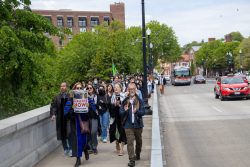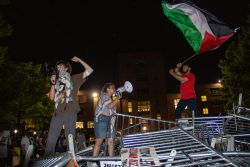The anti-war movement has gone mainstream.
Last Saturday’s anti-war protest in downtown Washington brought out somewhere between 30,000 and 500,000 people. No matter what the exact number, the crowd included both the usual and some not-so-usual groups of protesters. Mixed with veteran protesters were, as one homemade sign put it, “Mainstream White Guys for Peace.” As Martha Stewart, the queen of all things mainstream, would say, “This is a good thing.”
Don’t get us wrong-Martha and I are not suggesting a successful anti-war movement hinges on whether or not mainstream America-self-identified mainstream white guys and all—support it. But this weekend, we witnessed a new breed of anti-war protest.
Middle-of-the-road Americans are now standing side by side with pacifists, leftists and doves in opposition to the war. As any mainstream white guy might say, anti-war sentiment is hot.
Protest organizers planned the event to coincide with Martin Luther King, Jr. Day. Newspapers across the country ran stories linking King’s fight for civil rights with the protesters’ fight for peace. Many protesters were quoted as saying, “If Dr. King were alive today, he would have opposed this military action.”
Honestly, who better to align yourself with against the rich, white, southern, arguably racist president than Dr. King himself? It’s the Champion of Corporate Rights versus the Champion of Civil Rights, Dubious Dubya versus the Dreaming Doctor.
But the protesters need to use Dr. King for more than his support-garnering heroic iconoclasm. Many believe that if Dr. King were alive today he would not support Bush’s war plans. But Dr. King might not have supported the way in which the anti-war movement is being handled, either.
Can the Aug. 28, 1963 March on Washington even be compared to the one that took place on Jan. 18, 2003?
The Civil Rights movement had inspirational leaders, strongly articulated goals and a unified message. Through boycotts, sit-ins and strikes effectively applied economic pressure. Today’s peace movement lacks all of these qualities. Mara Verheyden-Hilliard of the Partnership for Civil Justice, one of the groups sponsoring the protest, said, “Demonstrations today showed the kind of people’s power it’s going to take to stop the war in its tracks.” However, it takes more than people power. In the ‘60s, it took a series of boycotts, sit-ins and strikes for blacks to gain full civil rights. It took a unified organization and an inspirational leader. Seven in 10 Americans would give U.N. weapons inspectors months more to pursue their arms search in Iraq, according to a new Washington Post ABC News poll. If the anti-war movement is to affect any serious change, the majority of Americans need to find some other way to show their dissatisfaction other than a Washington Post ABC News poll. Where are our boycotts? Who is our Dr. King?




